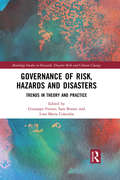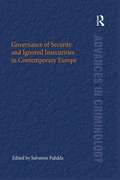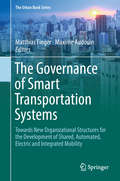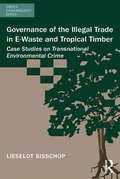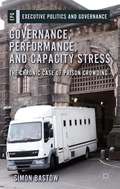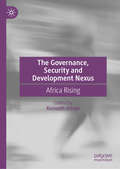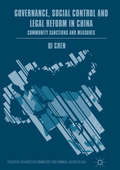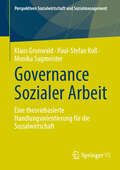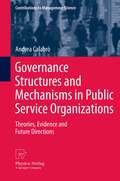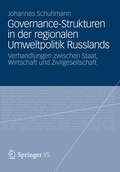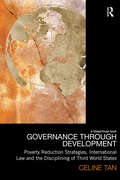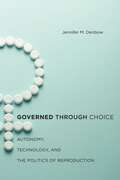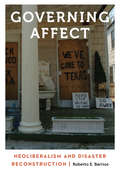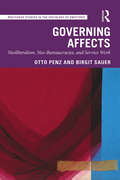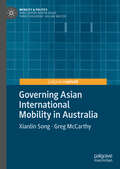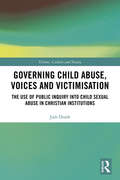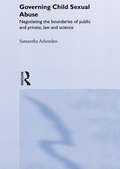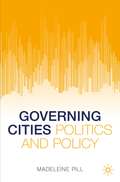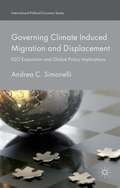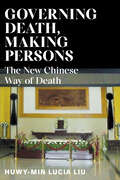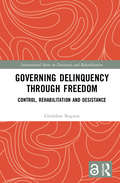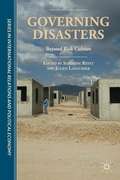- Table View
- List View
Governance of Risk, Hazards and Disasters: Trends in Theory and Practice (Routledge Studies in Hazards, Disaster Risk and Climate Change)
by Giuseppe Forino Sara Bonati Lina Maria CalandraGrowing debates around governance are taking place among academic, policy-making, and practice-based communities. In light of the increasing focus on governance, this book presents and discusses governance as a framework that is able to both conceptualize and contextualize risks and disasters as currently experienced and managed into social systems. Contributions offer a variety of perspectives, experiences and socio-cultural contexts which have identified the challenges, opportunities and critiques of promoting governance. Part I explores approaches, models, and keywords as applied to risk and disaster governance theory. Part II investigates practices of risk governance and associated issues by focusing on disaster risk reduction policy and practice. Finally, Part III explores practices of disaster governance and associated issues, by focusing on disaster recovery experiences. This book highlights cutting-edge recent theoretical and empirical trends and is a valuable resource for students, academics, practitioners and policy-makers interested in risk and disaster governance.
Governance of Security and Ignored Insecurities in Contemporary Europe (New Advances in Crime and Social Harm)
by Salvatore PaliddaThis book explores changes in security governance in Europe from the 1990s, focusing on some of the most important consequences: the proliferation of ignored insecurities, including the increase of oncological diseases, environmental disasters, shadow economies reproducing neo-slavery and fiscal fraud, and the general damage to the res publica. What is the articulation of removal, reclamation and consequently the implementation of devices and the establishing of prevention practices? Why are the majority of victims and also the control agency professionals seemingly resigned to these ignored insecurities? Following more than 20 years of research in the area, the authors examine these questions and how the securitisation of society has been exacerbated. They argue that the primary cause of the increase in ignored insecurities is the consequence of the neoliberal turn in security governance. This book proposes an innovative approach to security governance, not only through a serious analysis of the balance of the costs and benefits, but also highlighting what is here termed `ignored insecurities'. The authors propose a review of the problems, showing that the governance of security is a crucial element of the contemporary political organisation of society. The book ends with an innovative reflection on the Anthropocene debate and the COP21 summit which took place in Paris in December 2015.
The Governance of Smart Transportation Systems: Towards New Organizational Structures for the Development of Shared, Automated, Electric and Integrated Mobility (The Urban Book Series)
by Matthias Finger Maxime AudouinThis book presents essential new governance structures to embrace and regulate smart mobility modes. Drawing on a range of case studies, it paves the way for new approaches to governing future transportation systems. Over the past decades, Information and Communication Technologies have enabled the development of new mobility solutions that have completely redefined traditional and well-established urban transportation systems. Urban transportation systems are evolving dramatically, from the development of shared mobility modes, to the advent of electric mobility, and from the automated mobility trend to the rapid spread of integrated transportation schemes. Given the disruptive nature of those new mobility solutions, new governance structures are needed. Through a series of case studies from around the world, this book highlights governance and regulatory processes having supported, or sometimes prevented, the development and implementation of smart mobility solutions (shared, automated, electric, integrated). The combination of chapters offers a comprehensive overview of the different research endeavours focusing on the governance of smart transportation systems and will help pave the way for this important subject, which is crucial for the future of cities.
Governance of the Illegal Trade in E-Waste and Tropical Timber: Case Studies on Transnational Environmental Crime (Green Criminology)
by Lieselot BisschopThis book responds to the call for more research on transnational environmental crime and its governance by investigating the illegal trade in electronic waste (e-waste) and tropical timber, major forms of transnational environmental crime. The book is based on a qualitative multi-method research combining document analysis, interviews with key informants and field visits. Bisschop focuses on the flows that pass through the research setting of the Port of Antwerp (Belgium) and those between Europe and West and Central Africa. The study examines the emergence and social organization of these transnational environmental flows, illustrating that although profit or lure play a very important role, a range of factors on individual, organizational and societal levels together provide the motivations and opportunities. Building on these insights, the book addresses the governance of these two cases. The responsive regulatory pyramid and networked governance are used as theoretical frameworks for this analysis. This book is essential reading for scholars and academics interested in transnational environmental crime and corporate crime, as well as governance studies.
Governance, Performance, and Capacity Stress
by Simon BastowPublic policy systems often sustain chronic capacity stress (CCS) meaning they neither excel nor fail in what they do, but do both in ways that are somehow manageable and acceptable. This book is about one archetypal case of CCS - crowding in the British prison system - and how we need a more integrated theoretical understanding of its complexity.
The Governance, Security and Development Nexus: Africa Rising
by Kenneth OmejeThis edited book analyses the changing links between governance, security and development in Africa as they relate to the narrative that contemporary Africa has made remarkable progress in recent years, a phenomenon popularly known as “Africa rising.” The book presents a rigorous evaluation of the Africa rising debate and consequently offers innovative policy guidelines for Africa’s governance and development transformation.
Governance, Social Control and Legal Reform in China: Community Sanctions And Measures (Palgrave Advances in Criminology and Criminal Justice in Asia)
by Qi ChenThis book outlines how community sentences and early release options are administered in China. Chen provides empirical insights into the emerging community sector of the Chinese penal system, and illustrates how Chinese criminal courts decide between imprisonment and community sentences. Drawing on interviews with government and non-governmental supervisors, this methodological and rigorous study offers an in-depth discussion of the enforcement of these community sanctions and measures (CSM). By using the CSM reform as an example, this book illustrates the adaptation of Chinese governance and social control. Ultimately, Chen argues that the current model of governance in China (disciplinary governance) cannot guarantee an effective state-agent relationship; it also denies local governments sufficient legitimacy to secure social stability. Finally, proposing that only the rule of law and an active judiciary can complement these two deficiencies, this book will be of great interest to scholars of criminology, law, and penology, as well as anyone who is interested in how China is held together in a socio-legal sense.
Governance Sozialer Arbeit: Eine theoriebasierte Handlungsorientierung für die Sozialwirtschaft (Perspektiven Sozialwirtschaft und Sozialmanagement)
by Klaus Grunwald Monika Sagmeister Paul-Stefan RoßDer vorliegende Band widmet sich der Steuerung von sozialwirtschaftlichen Organisationen und von Unterstützungsarrangements der Sozialen Arbeit. Der Governance-Ansatz wird genutzt, um auf zentrale Steuerungsfragen Sozialer Arbeit konzeptionelle Antworten zu finden, die vor dem Hintergrund der gegenwärtigen gesellschaftlichen Transformationsprozesse tragfähig sind. Dazu greift er auf die Diskurse zu Welfaremix, Netzwerken sowie Organisationen und ihrer Steuerung zurück. Ziel ist eine theoretisch-konzeptionelle Fundierung der Handlungspraxis von (potenziellen) Führungskräften in der Sozialen Arbeit.
Governance Structures and Mechanisms in Public Service Organizations: Theories, Evidence and Future Directions
by Andrea CalabròThis book addresses the nexus of issues exploring governance structures and mechanisms in public service organizations, thus contributing to the development of disciplines that focus on public management. It goes beyond the state of the art by addressing a number of specific issues in a more systematic fashion. The book's interdisciplinary focus is a particularly valuable asset, as its topic is situated at the crossroads of a number of fields, including public management, business administration, corporate governance, policy studies, political science, sociology, and third sector studies, all of which offer important perspectives and are important for the development of public management and public services. The book covers more than Italy and Norway and focuses specifically on public service organizations, addressing more aspects of their governance structures and mechanisms than any other book available today. The unique presentation of features related to the governance and management of different actors (state-owned enterprises, local public utilities, ministries, municipalities, citizens, etc.), involved at different levels in the production and provision of public services, makes it possible to compare and contrast these different perspectives and opens new avenues of theoretical collaboration and development.
Governance-Strukturen in der regionalen Umweltpolitik Russlands
by Johannes SchuhmannAm Beispiel der Umweltverträglichkeitsprüfung (UVP) greift Johannes Schuhmann die Frage auf, wie der Konflikt zwischen Ökonomie und Ökologie im nicht-demokratischen System Russlands gelöst wird. Dabei zeigt er, dass auch unter den Bedingungen eines sich zunehmend in Richtung Autokratie entwickelnden politischen Systems Konflikte durch horizontale Verhandlungsbeziehungen zwischen Staat, Wirtschaft und Zivilgesellschaft gelöst werden. Die rechtlich garantierte Einbeziehung zivilgesellschaftlicher Organisationen erfolgt indessen nicht zuverlässig und nur dann, wenn die vom Autor herausgearbeiteten Faktoren gegebenen sind.
Governance through Development: Poverty Reduction Strategies, International Law and the Disciplining of Third World States (Law, Development and Globalization)
by Celine TanGovernance through Development locates the Poverty Reduction Strategy Paper (PRSP) framework within the broader context of international law and global governance, exploring its impact on third world state engagement with the global political economy and the international regulatory norms and institutions which support it. The PRSP framework has replaced the controversial structural adjustment programmes, as the primary mechanism through which official development financing is channelled to low-income developing countries. It has changed the regulatory landscape of international development financing, signalling a wider paradigmatic shift in the cartography of aid and, consequently, in the nature of north-south relations. Governance through Development documents and analyses this change within the legacy of postcolonial economic relations, revealing the wider legal, economic and geo-political significance of the PRSP framework. Celine Tan argues that the PRSP framework establishes a new regulatory regime that builds upon the disciplinary project of structural adjustment by embedding neoliberal economic conditionalities within a regime of domestic governance and public policy reform. The book will be of interest to scholars, researchers and students of law, political science and international relations, sociology and development studies.
Governed through Choice: Autonomy, Technology, and the Politics of Reproduction
by Jennifer M. DenbowA trailblazing look at how the law regulates women’s bodies as reproductive sites and what can be done about it.At the center of the “war on women” lies the fact that women in the contemporary United States are facing more widespread and increased surveillance of their reproductive health and decisions. In recent years states have passed a record number of laws restricting abortion. Physicians continue to sterilize some women against their will, especially those in prison, while other women who choose to forego reproduction cannot find physicians to sterilize them. While these actions seem to undermine women’s decision-making authority, experts and state actors often defend them in terms of promoting women’s autonomy.In Governed through Choice, Jennifer M. Denbow exposes the way that the notion of autonomy allows for this apparent contradiction and explores how it plays out in recent reproductive law, including newly enacted informed consent to abortion laws like ultrasound mandates and the regulation of sterilization. Denbow also shows how developments in reproductive technology, which would seem to increase women’s options and autonomy, provide even more opportunities for state management of women’s bodies. The book argues that notions of autonomy and choice, as well as transformations in reproductive technology, converge to enable the state’s surveillance of women and undermine their decision-making authority. Yet, Denbow asserts that there is a way forward and offers an alternative understanding of autonomy that focuses on critique and social transformation. Moreover, while reproductive technologies may heighten surveillance, they can also help disrupt oppressive norms about reproduction and gender, and create space for transformation. A critically important analysis, Governed through Choice is a trailblazing look at how the law regulates women’s bodies as reproductive sites and what can be done about it.
Governing Affect: Neoliberalism and Disaster Reconstruction (Anthropology of Contemporary North America)
by Roberto E. BarriosRoberto E. Barrios presents an ethnographic study of the aftermaths of four natural disasters: southern Honduras after Hurricane Mitch; New Orleans following Hurricane Katrina; Chiapas, Mexico, after the Grijalva River landslide; and southern Illinois following the Mississippi River flood. Focusing on the role of affect, Barrios examines the ways in which people who live through disasters use emotions as a means of assessing the relevance of governmentally sanctioned recovery plans, judging the effectiveness of such programs, and reflecting on the risk of living in areas that have been deemed prone to disaster. Emotions such as terror, disgust, or sentimental attachment to place all shape the meanings we assign to disasters as well as our political responses to them. The ethnographic cases in Governing Affect highlight how reconstruction programs, government agencies, and recovery experts often view postdisaster contexts as opportune moments to transform disaster-affected communities through principles and practices of modernist and neoliberal development. Governing Affect brings policy and politics into dialogue with human emotion to provide researchers and practitioners with an analytical toolkit for apprehending and addressing issues of difference, voice, and inequity in the aftermath of catastrophes.
Governing Affects: Neoliberalism, Neo-Bureaucracies, and Service Work (Routledge Studies in the Sociology of Emotions)
by Otto Penz Birgit SauerGoverning Affects explores the neoliberal transformation of state governance in Europe towards affective forms of dominance exercised by customer-oriented neo-bureaucracies and public service providers. By investigating the rise of affective labour in contemporary European service societies and the conversion of state administrations into business-like public services, the authors trace the transformative power of neoliberal political thought as it is put into practice. The book examines new affective modes of subjectivation and activation of public employees, as well as their embodiment of affective requirements, to successfully guide and advise citizens. Neoliberalism induces a double agency in neo-bureaucrats: entrepreneurialism is coupled with affective skills for the purpose of governing clients in their own best interests. These competences are unevenly distributed between the genders, as their affective dispositions differ historically. Drawing on the theoretical concepts of Foucault and Bourdieu, the book offers innovative insights into recent processes of state transformation, affective subjectivation, and changes in labour relations. By combining theory building on governance with empirical research in key areas of state power, the book will be of interest to scholars and researchers in a broad range of disciplines, including political science, political sociology, and critical governance studies.
Governing Asian International Mobility in Australia (Mobility & Politics)
by Xianlin Song Greg McCarthyThis book examines the governance of Asian student and academic mobility, which has transformed the higher education landscape. While campuses are experiencing an unprecedented level of diversity, knowledge creation remains explicitly Eurocentric and dominated by the Global North. The authors advocate for a new educational paradigm that takes into account the transcultural flow of knowledge on campus as a public good, capitalises on Asian students and academics’ multilingual competencies, and offers them equal access to creating quality-orientated education. The book argues that international higher education must be grounded in both a plurality of knowledges and the ethics of cognitive justice, and that the governing policies should facilitate the higher education sector to build a platform of internationalising affect and effect on campus.
Governing Child Abuse Voices and Victimisation: The Use of Public Inquiry into Child Sexual Abuse in Christian Institutions (Victims, Culture and Society)
by Jodi DeathChild sexual abuse by clergy within the Roman Catholic Church has emerged as a social and political discourse over the last three decades. The analysis here specifically focuses on the establishment, conduct, and outcomes of the extensive public inquiries of Australia, although inquiries in other jurisdictions are also discussed. Unlike criminal or civil processes, although they may be inquisitory in nature, public inquiries emerge from a specifically political context and are a tool of governance embedded in a larger context of governmentality. Understanding the broader political and cultural contexts of public inquiries is important, then, in understanding their value and effectiveness as justice processes – especially for victims of CSA by clergy. What is interesting about public inquiry is that it situates victims of CSA by clergy outside of criminal and civil justice processes and recognises a different politicised relationship between victims as citizens, the state, and Catholic institutions where abuse has occurred. At the cutting edge of disciplinary and methodological understandings of the interconnections between the church, state and families, his book explores the dynamics of the emergence and politicisation of victims of CSA by clergy, their expressions of resistance and the legitimisation of their voice in public and political spheres.
Governing Child Sexual Abuse: Negotiating the Boundaries of Public and Private, Law and Science
by Samantha AshendenThe turn of the 1990s saw a number of high profile public inquiries into the handling of child sexual abuse cases in Great Britain. In examines the implications of these inquiries on the regulation of relationships between families and the state, author Samantha Ashenden brings a number of contemporary debates in social and political theory to bear upon the governance of child sexual abuse. In particular, drawing on the work of Foucault and Habermas, Ashenden looks at:* how to analyze the boundary between public and private spheres* the legal and scientific determination of legitimate intervention* the relationship between democracy and expertise in the governance of social life.Timely and topical, this book will be of particular interest to scholars and students of social and political theory, political sociology, the sociology of law, and social policy.
Governing Cities: Politics and Policy
by Madeleine PillIn our urban world, cities are where most of us experience how our economies and societies are organised and the inequalities which result. This textbook introduces ideas, theories, concepts and examples to help us understand the political and policy challenges of governing cities, centred on the principal challenge of how to make our cities more equitable. It poses critical questions – about how cities are governed, by whom, according to what values, and for whom – and draws from a wide range of urban scholarship. The ‘how’ covers urban politics and the policy instruments which result. The ‘by whom’ addresses power relations within and beyond the city and the tensions between different priorities and values. The ‘for whom’ centres equity and the role of citizens and collective action in how we are governed. In addressing these questions, the book provides an overview of the core theories of urban politics and governance, thinks about what happens at different scales, and examines new forms of citizen activism which herald alternatives for cities. It is a unique introduction to students, policymakers and practitioners who want to understand and seek to improve urban politics and policy.
Governing Climate Induced Migration and Displacement: Igo Expansion And Global Policy Implications (International Political Economy Series)
by Andrea SimonelliAndrea Simonelli provides the first in-depth evaluation of climate displacement in the field of political science, specifically global governance. She evaluates four intergovernmental organizations (UNHCR, IOM, OCHA and the UNFCCC), and the structural and political constraints regarding their potential expansion to govern this new issue area.
Governing Cotton
by Adam SneydThis book traces the historic relationships between cotton production, the international cotton trade and poverty south of the Sahara, and assesses various approaches to corporate social responsibility and nongovernmental policy advocacy in this area.
Governing Death, Making Persons: The New Chinese Way of Death
by Huwy-min Lucia LiuGoverning Death, Making Persons tells the story of how economic reforms and changes in the management of death in China have affected the governance of persons. The Chinese Communist Party has sought to channel the funeral industry and death rituals into vehicles for reshaping people into "modern" citizens and subjects. Since the Reform and Opening period and the marketization of state funeral parlors, the Party has promoted personalized funerals in the hope of promoting a market-oriented and individualistic ethos. However, things have not gone as planned.Huwy-min Lucia Liu writes about the funerals she witnessed and the life stories of two kinds of funeral workers: state workers who are quasi-government officials and semilegal private funeral brokers. She shows that end-of-life commemoration in urban China today is characterized by the resilience of social conventions and not a shift toward market economy individualization. Rather than seeing a rise of individualism and the decline of a socialist self, Liu sees the durability of socialist, religious, communal, and relational ideas of self, woven together through creative ritual framings in spite of their contradictions.
Governing Delinquency Through Freedom: Control, Rehabilitation and Desistance (International Series on Desistance and Rehabilitation)
by Géraldine BugnonThis book analyses the non-custodial government of young offenders in two major cities in Brazil. In doing so, it delves into the paradox of an institution exerting control over youths while at the same time promoting their autonomy and responsibility. The study sheds light on the specific logics of power, control, and inequality produced by such institutional settings. The book’s analysis is based on an ethnographic study of ‘Assisted Freedom’ (Liberdade Assistida) – a form of probation – in the Brazilian cities of Rio de Janeiro and Belo Horizonte. This particular context – which is characterized by endemic violent crime, on the one hand, and a highly protective juvenile justice system, on the other – sheds productive light on the contradictions of juvenile justice systems and other public policies based on the values of citizenship, autonomy, and responsibilization. The analysis takes the form of an inverted zoom structure: it begins by looking at cognitive and interactional processes at the level of interpersonal relationships between youths and professionals, and then works its way up to examine ties outside the institution itself, with schools, the labour market, and juvenile courts. Written in a clear and direct style, this book will appeal to students and scholars in criminology, sociology, cultural studies, and social theory and those interested in learning about non-custodial measures and the regulation of juvenile delinquency.
Governing Disasters
by Ali Shahla F.With growing awareness of the devastation caused by major natural disasters, alongside integration of governance and technology networks, the parameters of humanitarian aid are becoming more global. At the same time, humanitarian instruments are increasingly recognizing the centrality of local participation. Drawing on six case studies and a survey of 69 members of the relief sector, this book suggests that the key to the efficacy of post-disaster recovery is the primacy given to local actors in the management, direction and design of relief programs. Where local partnership and knowledge generation and application is ongoing, cohesive, meaningful and inclusive, disaster relief efforts are more targeted, cost-effective, efficient and timely. Governing Disasters: Engaging Local Populations in Humanitarian Relief examines the interplay between law, governance and collaborative decision making with international, state, private sector and community actors in order to understand the dynamics of a global decentralized yet coordinated process of post-disaster humanitarian assistance.
Governing Disasters
by Sandrine Revet Julien LangumierIrreversible and exceptional events, disasters are nevertheless governed, usually in the context of specific, dedicated interventions by state authorities or NGOs, who aim to lead the affected population from a place of emergency to a new, post-disaster - but still undefined - position. How do the victims of disaster interact with the dispositifs of government and disaster? Based on extensive research - both ethnographic and historical - conducted over a long period of time in field locations as various as Hong-Kong, Kazakhstan, Sri Lanka, France, Argentina, and Italy, this volume offers an acute analysis of how actors at local, national, and international levels govern disasters. Chapter contributions show that the victims of disaster do not remain passive; rather, they react to and critique what this volume calls the 'government of disaster' and one of its central paradigms, the culture of risk, which leaves unaddressed key political issues.
Governing Enterprises in China: Corporate Boards, Ownership and Markets (Dynamics of Asian Development)
by Zhang Cheng Rajah Rasiah Kee Cheok CheongThis book examines the nature of the marketization of corporate boards following the introduction of the split share reform, corporate board and shareholder relations, corporate performance, and risk-taking conduct in China. The chapters cover topics such as determinants of corporate board size and independence, corporate risk-taking conduct under different controlling shareholder types. The book deepens our understanding of corporate governance mechanisms as most previous studies have limited their findings using mainstream perspectives grounded on neoclassical theory. It outlines that China’s corporate board composition is determined by the board’s scope of operation, monitoring, bargaining power, and other governance mechanisms and regulations. It also offers a comparison between China’s experience with other economies in general and other transition economies in particular. As such, the book represents an essential overview of the current concerns regarding corporate governance in China. It is of great interest to legal researchers, policymakers, and legal practitioners working with business investments in China.
